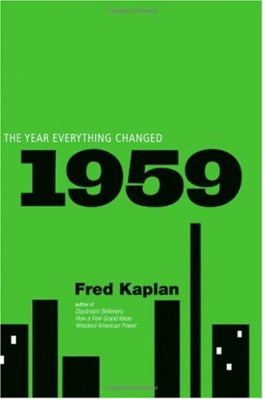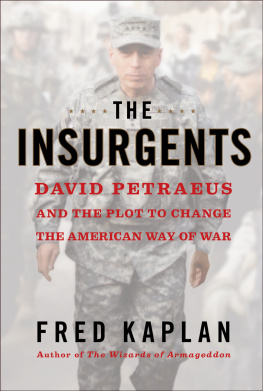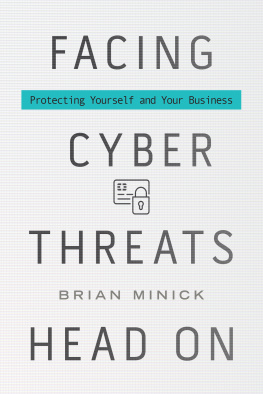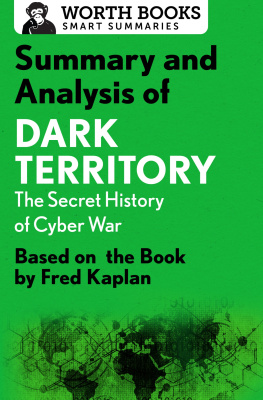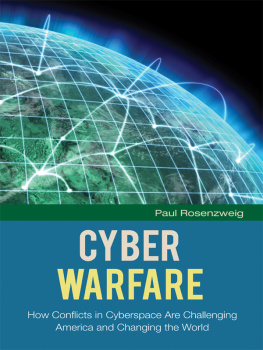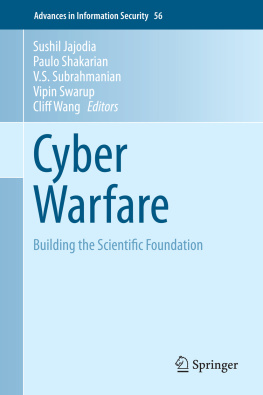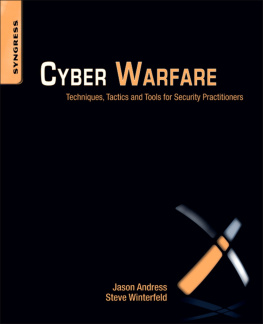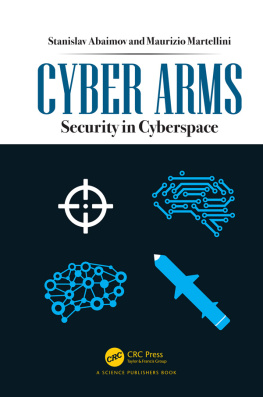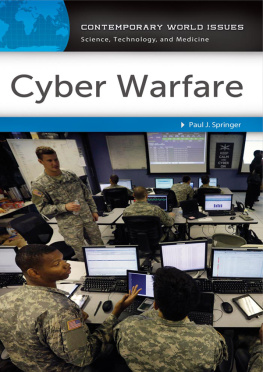Thank you for downloading this Simon & Schuster eBook.
Join our mailing list and get updates on new releases, deals, bonus content and other great books from Simon & Schuster.
C LICK H ERE T O S IGN U P
or visit us online to sign up at
eBookNews.SimonandSchuster.com
We hope you enjoyed reading this Simon & Schuster eBook.
Join our mailing list and get updates on new releases, deals, bonus content and other great books from Simon & Schuster.
C LICK H ERE T O S IGN U P
or visit us online to sign up at
eBookNews.SimonandSchuster.com
ALSO BY FRED KAPLAN
The Insurgents: David Petraeus and the Plot to Change the American Way of War
1959: The Year Everything Changed
Daydream Believers: How a Few Grand Ideas Wrecked American Power
The Wizards of Armageddon

Simon & Schuster
1230 Avenue of the Americas
New York, NY 10020
www.SimonandSchuster.com
Copyright 2016 by Fred Kaplan
All rights reserved, including the right to reproduce this book or portions thereof in any form whatsoever. For information, address Simon & Schuster Subsidiary Rights Department, 1230 Avenue of the Americas, New York, NY 10020.
First Simon & Schuster hardcover edition March 2016
SIMON & SCHUSTER and colophon are registered trademarks of Simon & Schuster, Inc.
For information about special discounts for bulk purchases, please contact Simon & Schuster Special Sales at 1-866-506-1949 or .
The Simon & Schuster Speakers Bureau can bring authors to your live event. For more information or to book an event, contact the Simon & Schuster Speakers Bureau at 1-866-248-3049 or visit our website at www.simonspeakers.com.
Book design by Ellen R. Sasahara
Jacket design by Jackie Seow
Library of Congress Cataloging-in-Publication Data
Kaplan, Fred M. Dark territory : the secret history of cyber war / Fred Kaplan. New York, NY : Simon & Schuster, 2016. | Includes bibliographical references and index.
LCSH: CyberterrorismPreventionUnited StatesHistory. | BISAC:
TECHNOLOGY & ENGINEERING / Military Science. | COMPUTERS /
Security /
Viruses. | HISTORY / Military / General.
Classification: LCC HV6773.15.C97 K37 2016 | DDC 363.325dc23 LC record available at http://lccn.loc.gov/2015027335
ISBN 978-1-4767-6325-5
ISBN 978-1-4767-6327-9 (ebook)
for Brooke Gladstone
CONTENTS
CHAPTER 1
COULD SOMETHING LIKE THIS REALLY HAPPEN?
I T was Saturday, June 4, 1983, and President Ronald Reagan spent the day at Camp David, relaxing, reading some papers, then, after dinner, settling in, as he often did, to watch a movie. That nights feature was WarGames , starring Matthew Broderick as a tech-whiz teenager who unwittingly hacks into the main computer at NORAD, the North American Aerospace Defense Command, and, thinking that hes playing a new computer game, nearly triggers World War III.
The following Wednesday morning, back in the White House, Reagan met with the secretaries of state, defense, and treasury, his national security staff, the chairman of the Joint Chiefs of Staff, and sixteen prominent members of Congress, to discuss a new type of nuclear missile and the prospect of arms talks with the Russians. But he couldnt get that movie out of his mind. At one point, he put down his index cards and asked if anyone else had seen it. Nobody had (it had just opened in theaters the previous Friday), so he launched into a detailed summary of its plot. Some of the legislators looked around the room with suppressed smiles or arched eyebrows. Not quite three months earlier, Reagan had delivered his Star Wars speech, calling on scientists to develop laser weapons that, in the event of war, could shoot down Soviet nuclear missiles as they darted toward America. The idea was widely dismissed as nutty. What was the old man up to now?
After finishing his synopsis, Reagan turned to General John Vessey, the chairman of the Joint Chiefs, the U.S. militarys top officer, and asked, Could something like this really happen? Could someone break into our most sensitive computers?
Vessey, whod grown accustomed to such queries, said he would look into it.
One week later, the general came back to the White House with his answer. WarGames , it turned out, wasnt at all far-fetched. Mr. President, he said, the problem is much worse than you think.
Reagans question set off a string of interagency memos, working groups, studies, and meetings, which culminated, fifteen months later, in a confidential national security decision directive, NSDD-145, signed September 17, 1984, titled National Policy on Telecommunications and Automated Information Systems Security.
It was a prescient document. The first laptop computers had barely hit the market, the first public Internet providers wouldnt come online for another few years. Yet the authors of NSDD-145 noted that these new deviceswhich government agencies and high-tech industries had started buying at a rapid clipwere highly susceptible to interception, unauthorized electronic access, and related forms of technical exploitation. Hostile foreign intelligence agencies were extensively hacking into these services already, and terrorist groups and criminal elements had the ability to do so as well.
This sequence of eventsReagans oddball question to General Vessey, followed by a pathbreaking policy documentmarked the first time that an American president, or a White House directive, discussed what would come to be called cyber warfare.
The commotion, for now, was short-lived. NSDD-145 placed the National Security Agency in charge of securing all computer servers and networks in the United States, and, for many, that went too far. The NSA was Americas largest and most secretive intelligence agency. (Insiders joked that the initials stood for No Such Agency.) Established in 1952 to intercept foreign communications, it was expressly forbidden from spying on Americans. Civil liberties advocates in Congress were not about to let a presidential decree blur this distinction.
And so the issue vanished, at least in the realm of high-level politics. When it reemerged a dozen years later, after a spate of actual cyber intrusions during Bill Clintons presidency, enough time had passed that the senior officials of the daywho didnt remember, if theyd ever known of, NSDD-145were shocked by the nations seemingly sudden vulnerability to this seemingly brand-new threat.
When the White House again changed hands (and political parties) with the election of George W. Bush, the issue receded once more, at least to the public eye, especially after the terrorist attacks of September 11, 2001, which killed three thousand Americans. Few cared about hypothetical cyber wars when the nation was charging into real ones with bullets and bombs.
But behind closed doors, the Bush administration was weaving cyber war techniques with conventional war plans, and so were the military establishments of several other nations, friendly and otherwise, as the Internet spread to the globes far-flung corners. Cyber war emerged as a mutual threat and opportunity, a tool of espionage and a weapon of war, that foes could use to hurt America and that America could use to hurt its foes.
During Barack Obamas presidency, cyber warfare took off, emerging as one of the few sectors of the defense budget that soared while others stayed stagnant or declined. In 2009, Obamas first secretary of defense, Robert Gates, a holdover from the Bush years, created a dedicated Cyber Command. In its first three years, the commands annual budget tripled, from $2.7 billion to $7 billion (plus another $7 billion for cyber activities in the military services, all told), while the ranks of its cyber attack teams swelled from 900 personnel to 4,000, with 14,000 foreseen by the end of the decade.
Next page

